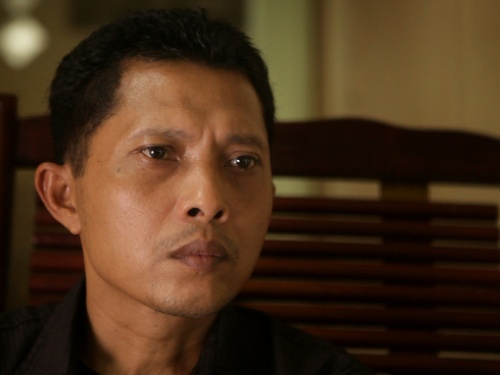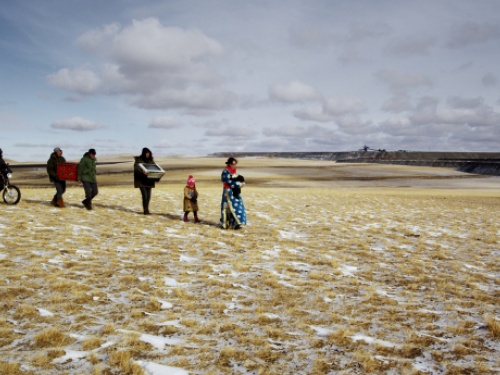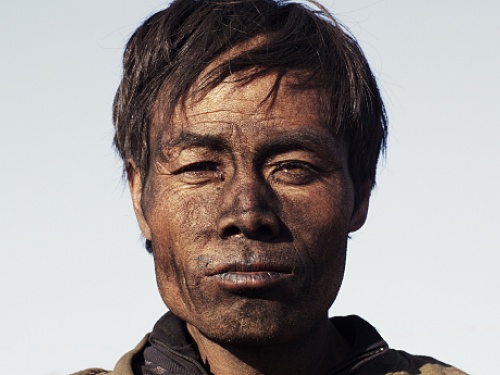Representing Conflict: Fragment 53
How should we represent war? Ahead of the opening of our inaugural Frames of Representation festival, Open City Documentary Festival Programmer Oliver Wright speaks to Fragment 53 directors Carlo Gabriele Tribbioli and Federico Lodoli about the genesis of their film, the experience of interviewing soldiers in Liberia and their approach to representing conflict.
Frames of Representation (FoR) is a film festival which showcases new forms of documentary cinema and invites discussion around the issues represented on screen.
Can you speak a little about your choice to depersonalise your subjects and address the universal acts, motivations and atrocities of warfare? How does this relate to the film's title?
From the beginning of the project we had no interest in portraying war from a naturalistic, historical, social or political point of view. Our aim was to consider a case study, such as the Liberian civil war, only to transfigure its material reality in order to build a non-narrative piece that could speak a wider, non-local language. As a consequence of this choice we avoided filming the psychological aspects of our characters as far as possible, as well their everyday life or social context. Our protagonists had to be living arguments, ethical instances or physical embodiments of abstract forces.
"Our protagonists had to be living arguments, ethical instances or physical embodiments of abstract forces."
From a technical point of view, this led us to adopt hyper close-up as it allowed us to exclude any reference to a particular space and time. Since the location where the encounters were staged was out of the frame, each interview could be in any place or any time. As they were shot out of context, the viewer is forced not only to concentrate on their tales of war but also on their physical performances. This is the way we always conceived and approached them, as human expressions of conflict considered as a principle or a force imposing its own law - something that goes beyond any moral, juridical or political commandment. The title quotes from Greek philosopher Heraclitus’ Fragment 53 describing war "as father of all and of all king", where conflict in its largest sense is the philosophical and metaphysical force at the basis of the whole of nature, its birth, its development and its end.
Why do you think your subjects agreed to be interviewed?
As you can imagine, we were not able to interview all the warriors we listed and we looked for. Since prosecutions are still pending on some former fighters, this brought understandable suspicion on us. Nevertheless, our way of approaching the subject without judging what they did made them comfortable and persuaded some of them to talk.
"Every fighter still believes that the cause he fought for was legitimate and generally there is no regret for what they’ve done."
Most of these warriors fought for fifteen to twenty years. These years spent on the front represent the most important experience of their whole life. During the war years, as they were high-ranking generals, these warriors were well known and powerful. Yet, at the end of the war they were dismissed by the government and forgotten by most of the population. So, they were quite happy to meet someone willing to know about their stories. That is why, once we were able to have their trust, they were willing to speak about them. Moreover, every fighter still believes that the cause he fought for was legitimate and generally there is no regret for what they’ve done: atrocities were committed under the eyes of everybody. There’s no point in denying them.
As Italian artists, what drew you to this subject matter? What was your initial encounter with the conflict you are investigating?
We both have a classical and philosophical studies background. Due to certain interests we share, in 2011 we started to discuss the nature of conflict and war on a theoretical level: is it legitimate to conceive “war” as the human embodiment of what we name “conflict”? To what extent is conflict, from a philosophical and metaphysical point of view, the force originating and ruling a world that is in a state of “eternal becoming”?
"We had no interest in portraying war from a naturalistic, historical, social or political point of view."
We thought we had to physically confront our abstract idea with reality by meeting “material actors” of war. We started looking for a conflict case that could match our needs. It had to be a “sleeping” conflict, which means currently non active, yet rooted on unresolved instability - factors offering us the possibility of meeting the protagonists of that war. Moreover, it had to be a non ideologically-motivated conflict as a religious, political or social motivation would have spoiled our idea of grasping the bare essence of the war. Finally, it had to be a war fought on a human level—on the frontline by men against other men—in order for us to grasp the individual and existential aspect of it.
The video The Execution of President Samuel K. Doe by Prince Y. Johnson showed us that the Liberian case was something we could work on. ■
Frames of Representation: New Visions for Documentary Cinema runs 20 - 27 April 2016.
Fragment 53 is screened on 21 April, followed by a Q&A with the directors.
This article is posted in: Articles, Blog, Events, Film, Interviews
Tagged with: Frames of Representation, Fragment 53, Philosophy, interviews, interview, Director, Directors, Ethics of Representation, ethics, Documentary, War, Conflict, Liberia, Oliver Wright, Carlo Gabriele Tribbioli, Federico Lodoli, Heraclitus







